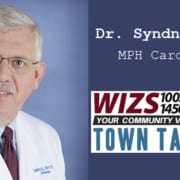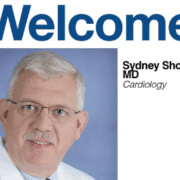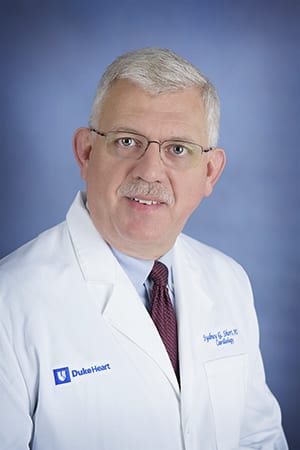TownTalk 2-10-21: Dr. Sydney Short, MPH Cardiology; Feb is American Heart Month
February is American Heart Month, and a local cardiologist was happy to steal the medical spotlight from COVID-19 for a short while to discuss heart health, risk factors and ways people can contribute to their own good heart health.
Dr. Sydney Short has more than 30 years’ experience as a cardiologist, and he has been at Maria Parham Health since late January 2019. He spoke with John C. Rose on Wednesday’s Town Talk. In addition to the usual suggestions for improving heart health – regular exercise, watch your diet, and stop smoking – Short offered additional insights to help people feel better about how they treat their hearts.
Although heart disease is an increasing concern, he said, advances in treatments are encouraging. “It’s important,” Short said, “and something that a lot of people deal with in their lives.” And yes, regular exercise is still the best way to improve your heart function,” Short said. During the pandemic, however, regular exercise regimens may have been affected by COVID-19 restrictions. It needs to be sustained, aerobic exercise that gets your heart rate up, Short reminded. Unfortunately, simply being physically active in the workplace doesn’t count.
He said he has enjoyed having an ongoing doctor-patient relationship with his patients. When patients come in with a problem and have a heart catheterization study “and you see that it can be fixed, patients often feel better quickly and get back to a normal life,” he said. “It’s fun to be involved in their lives and see how much better they’re doing after they’ve actually been able to have an intervention,” Short added.
To Hear Dr. Short’s TownTalk Interview, Click Play…and continue reading below.
Of course, it’s always better to maintain good heart health and not need the services of a cardiologist. But for those who need a cardiologist’s care, help is a short drive away. “It’s very exciting and very rewarding to see patients get this health care that previously had been a farther distance away – and now it’s on their doorstep,” Short added. Maria Parham’s Cardiology office is located behind the main hospital in the Jenkins Building.
There’s a difference between heart disease and a heart attack, Short explained. For example, a person who exhibits chest pain each day when he walks to the mailbox is probably describing an ongoing or developing heart problem. Sudden, immediate pain in the chest, however, is more associated with a heart attack.
Symptoms, in addition to sudden chest pain that are warning signs of a heart attack include: breaking out in a sweat, shortness of breath, weakness and dizziness, Short said. “The longer I’ve been in medicine, the more unusual presentations I’ve seen,” he explained. “Most patients have a more typical kind of presentation with their chest pain, with their heart problem.” But that pain could show up in other areas, such as back pain or other areas. And women seem to exhibit more unusual or out-of-the-ordinary symptoms, he said. “All of these symptoms should be taken seriously,” he said.
Short puts family history at the top of the list of indicators of heart disease. Smoking is a very important risk factor, too. Although other health conditions such as diabetes, hypertension and high cholesterol can contribute to heart disease, Short said, it’s not a done deal.
“If all those are treated and are under control, you are less likely to have heart disease,” he said. “We do speak of those risk factors when patients come into the office. It’s one of the first things we go through” he said, and then he and the patient try to modify those factors to decrease the chances of having problems in the future.
Similarly, people who have already experienced some sort of heart problem can take steps to maintain good heart health. “Once they’ve had an event of some kind, then we work very carefully … to try to decrease their risk of having further problems in the future.”
“If you still smoke, then you are much more likely to have another problem with your heart in the future,” Short said. “If you have had heart disease in the past, you definitely need to stop smoking,” he said.
(This article and the audio contained within are not meant to offer any diagnosis or treatment or offer medical advice. Maria Parham Health is a paying advertising client of WIZS. This is NOT a paid ad.)



 Dr. Short is a Duke Health physician and joins Maria Parham Health from Duke Cardiology of Lumberton, where he also sees patients. Before Duke Cardiology of Lumberton, he was a staff cardiologist at Duke Health Center of Sanford.
Dr. Short is a Duke Health physician and joins Maria Parham Health from Duke Cardiology of Lumberton, where he also sees patients. Before Duke Cardiology of Lumberton, he was a staff cardiologist at Duke Health Center of Sanford.